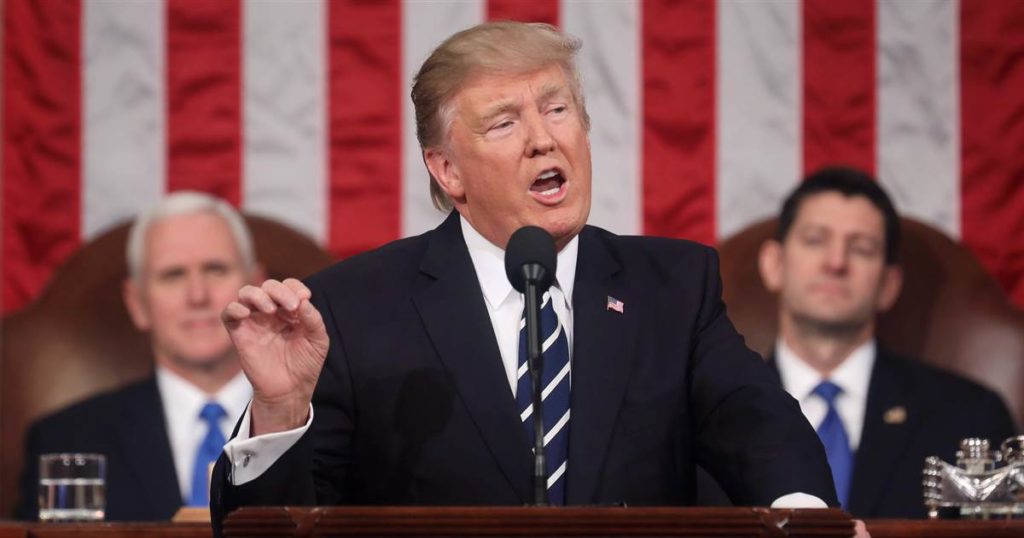by MARIA VIRGINIA OLANO

Source: synergyradionetwork.com
President Donald Trump began his first State of the Union address to Congress on Tuesday night by lamenting the myriad of climate disasters that struck the nation in 2017. “We endured floods and fires and storms” he said. In the same speech, he later prided himself on ending “the war on beautiful clean coal.”
There are two fundamental problems with those statements: first, there is no such thing as ‘clean’ coal; second, and perhaps more baffling is the irony that escapes the President when he laments extreme weather events while glorifying the practices that have created them.
Besides these remarks, the President ignored climate issues altogether and, not surprisingly, the manmade burning of heat-trapping gases that have intensified those risks. But there are four key points that President Trump focused on in his speech which are inextricably linked to climate change:
THE ECONOMY
A big point of the address was boasting about the growth of the economy and the high the stock market has been riding. However, there was no mention of the $306 billion in damage caused by natural disasters on U.S. soil in 2017 alone. How can we continue to brag about a growing economy without taking into account the financial risks and massive burden posed by natural disasters? Talking about protecting American economic interests should undoubtedly take into account mitigation and adaptation safeguards to climate risks, which have already taken a huge financial toll on the nation.
The President has also neglected a huge economic opportunity by waging war on clean energy sources. Solar and wind power have grown 20-fold in the past decade and are creating jobs at much higher rates than the rest of the economy. An Administration truly concerned about the energy and economic security of its country should be supporting these industries.
NATIONAL SECURITY
From the beginning of his campaign, Donald Trump has been big on national security. From revamping the military, to strengthening border patrol and building a wall to keep dangerous immigrants from entering the country, keeping Americans safe has always been a key promise of this Administration. 362 Americans died in 2017 due to hurricanes, floods, wildfires and other natural disasters–– the same year during which President Trump dropped climate change from the U.S. national security strategy. Not considering climate risks as a threat to national security is nearsighted and dangerous. In fact, even Secretary of Defense James Mattis stated during his confirmation hearing that climate change “is impacting stability in areas of the world where our troops are operating today.”
So how can we continue to talk about building a wall along the southern border, when in reality we will need to build seawalls to safeguard communities from flooding and rising seas? How can we continue to encourage fossil fuel burning when those very emissions are causing conditions that threaten global stability and, in turn, American troops abroad?
ENERGY
Another key point in Trump’s Tuesday address was energy security. The President boasted about the ‘revival’ of American energy, and prided himself on bringing independence to U.S. energy consumption. The President and his Administration seem to be proud of the environmental deregulation that has allowed for coal mining jobs to rise over the past year, and expanded oil and gas drilling permits. However, the underlying truth is that fossil fuel resources are finite, and as long as the United States continues to rely on these for its energy needs, it will be at risk. Coal is no longer a viable or affordable source of generating energy, it has in fact been mostly displaced by natural gas.
It was especially disheartening to hear the President’s remarks on Puerto Rico, claiming “we are with you, we love you, and we will pull through together” with no acknowledgement of the fact that months after hurricane Maria, 1.5 million U.S. citizens in the island still have no electricity.
INFRASTRUCTURE
Another talking point in the address was the need to revamp American infrastructure. Yet much of the infrastructure we will need to build in the coming decades will be closely linked to the changing climate and must take into account the associated risks, such as sea level rise and flooding due to storm surge. As long as climate risks continue to be ignored by the Administration’s plans, many updates to the current infrastructure, specifically in coastal regions, will be poorly conceived and won’t address current vulnerabilities.
Trump’s dismissal of climate change is myopic, misguided, and could undermine U.S. security, economy and competitiveness. Climate change is not only the single largest existential threat at present, but its implications are wide-ranging and spill over to most other areas of governance. A warming climate poses risks to our national security, economy and energy security and its effects must be considered when making any and all future investment choices. Political and scientific debates aside, we have already felt the human and financial tolls that extreme weather events have had on this nation, which are only forecasted to get worse. The United States government needs to once again take climate change into consideration when working on issues of national security, economic health, energy, and global competitiveness.
 MARIA VIRGINIA OLANO POLICY AND RESEARCH FELLOW
MARIA VIRGINIA OLANO POLICY AND RESEARCH FELLOW
Maria Virginia is a young professional with experience in non-profit and coalition organizing in the areas of disarmament and human rights. She is currently pursing a Masters degree in Security and Resilience Policy at Northeastern University, where she also completed her undergraduate degree in Political Science. During her time at Northeastern she studied abroad in Japan, India and Saudi Arabia and worked as a journalism intern in Bosnia Herzegovina and Turkey. She is passionate about travel and photography and in her free time loves to watch movies, eat lots of food and read.








